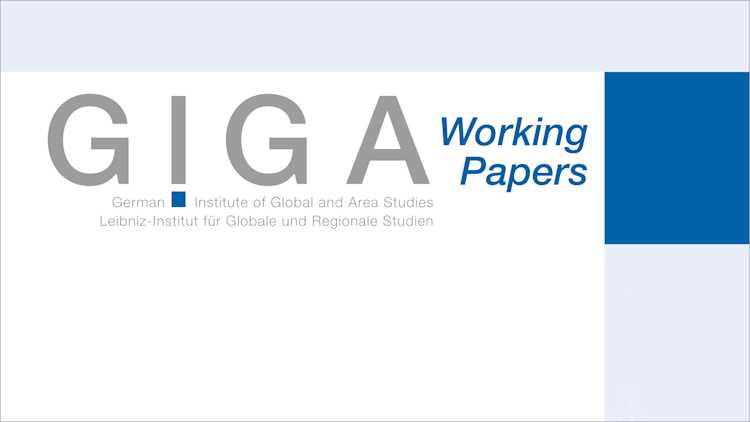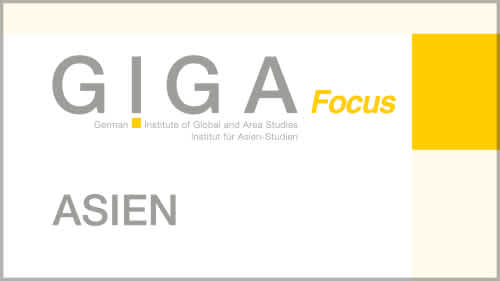- Home
- Publications
- GIGA Focus
- Parlamentswahlen in Indonesien: Präsident Susilo im Aufwind
GIGA Focus Asia
Parlamentswahlen in Indonesien: Präsident Susilo im Aufwind
Number 5 | 2009 | ISSN: 1862-359X
Die indonesischen Parlamentswahlen vom 9. April 2009 verliefen weitgehend friedlich und wurden von Beobachtern als im Wesentlichen "frei und fair" eingestuft. Insgesamt ist die junge Demokratie weiter stabilisiert worden, allerdings erfüllen die politischen Parteien wichtige Funktionen nur unzureichend und gelten in der Bevölkerung überwiegend als korrupte Organisationen.
Analyse Das indonesische Parteiensystem wird von säkularen Parteien dominiert. Die Ergebnisse verdeutlichen einen Trend der Schwächung von "Strömungen" (aliran), die das Parteiensystem lange strukturiert haben. Diese Entwicklung ist auf die zunehmende Personalisierung, Medialisierung und Kommerzialisierung der Politik zurückzuführen.
Mit 20,8 % der Stimmen ist die PD (Partai Demokrat, Democratic Party) von Präsident Susilo Bambang Yudhoyono als Siegerin aus den Wahlen hervorgegangen. Die großen, tendenziell säkularistisch orientierten Parteien, Golkar (Partai Golongan Karya, Party of Functional Groups) und PDI-P (Partai Demokrasi Indonesia – Perjuangan, Indonesian Democratic Party – Struggle), haben ebenso wie die kleineren islamischen Parteien deutlich an Stimmen eingebüßt, während die mit großen Hoffnungen angetretene islamistische PKS (Partai Keadilan Sejahtera, Prosperous Justice Party) nur leichte Stimmengewinne verbuchen konnte.
Der schnelle Aufstieg der PD, aber auch zwei kleinerer Parteien zeigt, dass das Parteiensystem immer noch fluide ist.
Jüngste Wahlrechtsreformen (die Einführung einer "offenen Liste") haben lokale Politiker gestärkt und die Parteizentralen in Jakarta geschwächt. Es bleibt abzuwarten, ob die Parteien in den nächsten Jahren immer mehr in Faktionen zerfallen oder ob die Dezentralisierung zu größerer Transparenz und innerparteilicher Demokratie führt.
Bei den Präsidentschaftswahlen im Juli werden drei Kandidatenpaare antreten. Amtsinhaber Susilo Bambang Yudhoyono hat sehr gute Chancen, wiedergewählt zu werden.
Footnotes
Regional Institutes
Research Programmes
How to cite this article
Ufen, Andreas (2009), Parlamentswahlen in Indonesien: Präsident Susilo im Aufwind, GIGA Focus Asia, 5, Hamburg: German Institute for Global and Area Studies (GIGA), http://nbn-resolving.de/urn:nbn:de:0168-ssoar-276987
Imprint
The GIGA Focus is an Open Access publication and can be read on the Internet and downloaded free of charge at www.giga-hamburg.de/en/publications/giga-focus. According to the conditions of the Creative-Commons license Attribution-No Derivative Works 3.0, this publication may be freely duplicated, circulated, and made accessible to the public. The particular conditions include the correct indication of the initial publication as GIGA Focus and no changes in or abbreviation of texts.
The German Institute for Global and Area Studies (GIGA) – Leibniz-Institut für Globale und Regionale Studien in Hamburg publishes the Focus series on Africa, Asia, Latin America, the Middle East and global issues. The GIGA Focus is edited and published by the GIGA. The views and opinions expressed are solely those of the authors and do not necessarily reflect those of the institute. Authors alone are responsible for the content of their articles. GIGA and the authors cannot be held liable for any errors and omissions, or for any consequences arising from the use of the information provided.



